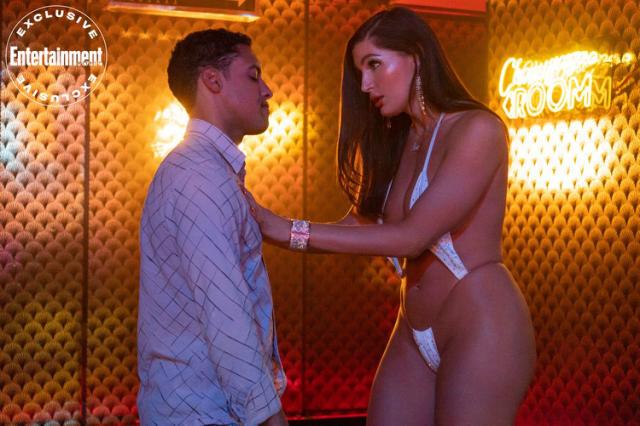Based on actual events outlined in Jessica Pressler’s 2015 New York magazine article “The Hustlers at Scores,” Lorene Scafaria’s Jennifer Lopez-starring crime saga Hustlersis billed as a dramatized version of true events — a reality actress Trace Lysette was all too familiar with before she became a breakout star in Amazon’s Transparent. Lysette tells EW Scafaria’s script — about a band of club employees who band together to scam money out of their Wall Street clientele — spoke to her experience as a survival sex worker dancing for tips at a New York City club prior to her Hollywood debut. Below, the star opens up about how her past as an exotic dancer informed her role in Hustlers, how a single tweet landed her the gig, and the importance of trans visibility (as well as the fact that the gender identity of her character, Tracey, is never discussed in the film) in mainstream movies. As told to Joey Nolfi.
I danced at Scores on and off for over eight years, during the time that the movie is set, and it was too close to home to only take the proper Hollywood channels. I told my agent, but I was so excited that I blurted on Twitter that I used to work there, and I wanted to help, whether that meant as a consultant or somehow getting a part. I wasn’t quite sure; I was just happy that this story was finally getting told, because I know so many courageous women who stripped — some of the most amazing women I’ve ever met in my life were strippers while raising kids or going to school. They’re hustlers through and through.
This is such a redemptive story, because we’ve revered powerful, wealthy men throughout film history, so I was ecstatic about seeing that flipped on its head and seeing that through a woman’s lens. It shows strippers and women who work in strip clubs from a different point of view, because usually when there’s a stripper or sex worker on TV or in film, it’s usually in passing, and they’re usually the aide to whatever male lead or character. But, this is the opposite. It’s from the point of view of the dancers, and I love that.
Lorene Scafaria ended up seeing my tweet, and we went to lunch. I told her a bunch of old stories about working there and crazy things that happened. She ended up writing me a role! We didn’t discuss [the character’s gender] at all, and I think that’s fine, because when I worked in the club, I didn’t discuss it at all in real life. The character isn’t specifically trans, so it’s up to the audience to determine whatever they want about Tracey. She’s a woman getting her money and juggling her insecure boyfriend, the perils of that kind of life, and the financial crash and what that did to the cash flow.
For me, as a trans woman, dancing was deeply affirming, because I didn’t disclose my business to anyone (except for a select few confidantes) when I was dancing. It kind of validated my womanhood in a way at that time when I was a youngster. Over the years, I grew not only as a woman, but intellectually, and understood that we were there to make money, but also as a toy for these rich, powerful men. It took a minute for that to set in for me. It’s that duality that you juggle in that line of work, and you have to keep your wits about you and remain in your power at all times, because it’s a slippery slope. I’d never suggest anyone go into a line of work unless they felt like they could handle it and probably have no other options. For me, I had no other options. It was about survival. The circumstances in my life led me there and I made the most of it. It’s important to talk about Tracey’s identity, but it’s also important to give the audience their own takeaway. I’ve played non-trans-specific roles and I’ve played outwardly trans roles, so I welcome something like this, where it’s not the focal point of the character. But, I’m a well-known trans actor, so I suspect if people watching don’t know me, they’ll look me up and say, “Oh, I didn’t know! Maybe I know someone who’s trans now, through a movie!”

I’ve played sex workers so many times, and I’ve been lucky in that most of them have something to say; they’re not just a trope, and they have some sort of character arc or something that humanizes them. Maybe one day I will get to play a superhero, but any time I get the chance to play a woman who works in the sex work field and I get to humanize them as a three-dimensional character, it allows Middle America to get to know them and understand their struggles as humans.
When I stepped into the club on set, it felt so eerily familiar, because I hadn’t been back to a strip club since I cleaned out my locker almost four years ago, when I made the jump to acting full time. I was wearing next to nothing, in a rhinestone, see-through dress in a room full of well-dressed patrons. I had a rush of anxiety because it felt so authentic, but then I was like, “Oh s—t, here we are, back at the f—ing club! Get into character, bitch!” So, I walked in and threw off my robe and felt totally cared for by Lorene. I gave my lapdance, twerked my ass, and had a good time. It’s like riding a bicycle: you never forget!













